True, I haven't mentioned that remarkable cat since the goldfish entry. That entry demonstrated his wily and superior survival skills. The Hunger Year of 44 had a terrible effect on everyone. There were absolutely no pets visible in the city. People who had pets kept them inside. Winky was one such indoor survivor. He learned to eat what we ate. If we were having potatoes, Winky got potatoes, the same with sugar beets or tulip bulbs. Meat was rare and he got very little. But Winky was resourceful - hence the disappearing goldfish.
One family tale was about Winky's hunting prowess. He caught mice in unexpected places like in the WC. He was observed lurking on the toilet seat staring at the floor. Then he would rise and stealthily move round and round the seat. This would continue for hours but finally paid off. He had caught his mouse. I can't imagine that any mouse that year could have provided much food, but a little fresh meat is better than none.
At the same time we were eating meatless meals. We had lots of potatoes though due to a KLM initiative where KLM employees were encouraged to contribute sweat equity to growing potatoes on KLM land. Senior Management paid for the seed potatoes and the gardening equipment. The project took off and potatoes were provided to everyone each fall. Neighbours were very suspicious of our bounty and assumed all kinds of nefarious activities. They were not lucky enough with their employers. KLM had a variety of initiatives that provided food and assistance to their workers.
At home, potatoes were augmented with sugar beets and tulip bulbs that provided a lot of nutrients. The only bread I remember, was very dark, grainy and sour tasting. I'm reminded of the taste when I eat dark pumpernickle bread. I dislike dark pumpernicle intensely. Most unpleasant.
Occasionally, my mother, father or one of my tantes got hold of a couple of eggs, or a slab of cheese. God only knows what they traded for those treats. My mother was very inventive. She made an imitation peanut butter from chick peas that was edible but not wonderful and of course ersatz coffee was made from chicory. My favourite food was a pudding made from corn meal with a fruit flavored sauce. This treat was produced for special occasions only. It was still possible to acquire some things for a steep price on the black market and special occasions meritted the extra expenditure.
Our big break came when my father went into hiding. He was sent to a safe house to live with a country butcher and his family. My father became their son who returned to assist in the slaughter house. My mom and I were later sent to join him. I don't remember for how long we stayed or the date precisely, but I do remember eating very well, everyone around a big family table - men, their wives and children eating meat.
There was a regulation that no livestock could be butchered for local consumption. All meat would go to the German military or be exported to Germany. The only exception to that rule, injured or sick animals could be butchered for local consumption. As my father would say, it's amazing how many pigs choked to death on potatoes. Once the Nazis attention shifted elsewhere and my father was in less danger, we returned to the city. That infusion of healthy eating was the equivallent of Winky's mouse and it kept us alive. Many, many others were not so lucky - they didn't have a mouse to catch.
skip to main |
skip to sidebar

Facebook Badge
About Me

- kingmisha
- I'm bigger than a pile of breadboxes, but smaller than a Sherman tank. I'm overeducated, underpaid but very content with my life. I have loved infrequently but intensely. I dated a poet, divorced a Dean, had an affair with a jazz pianist, was engaged to a diplomat, and widowed by my child's father. The men in my life were all very special. Not all grand passions but much loved in their time: Leonard Cohen, Alfred Pinsky, Billy Horn, Wendell Goodin, and Elliot Hirschman. Thanks for the memories... I'm a lapsed artist which doesn't really trouble me because I'm a very successful parent. I lacked the requisite conceit to persevere as an artist. I just couldn't make myself believe that my art came before my child. The world really doesn't need another sculptor (even a good one), but it does need another good human being. It can use all the good human beings we can turn out. I present Mambolica as my evidence so judge for yourselves.